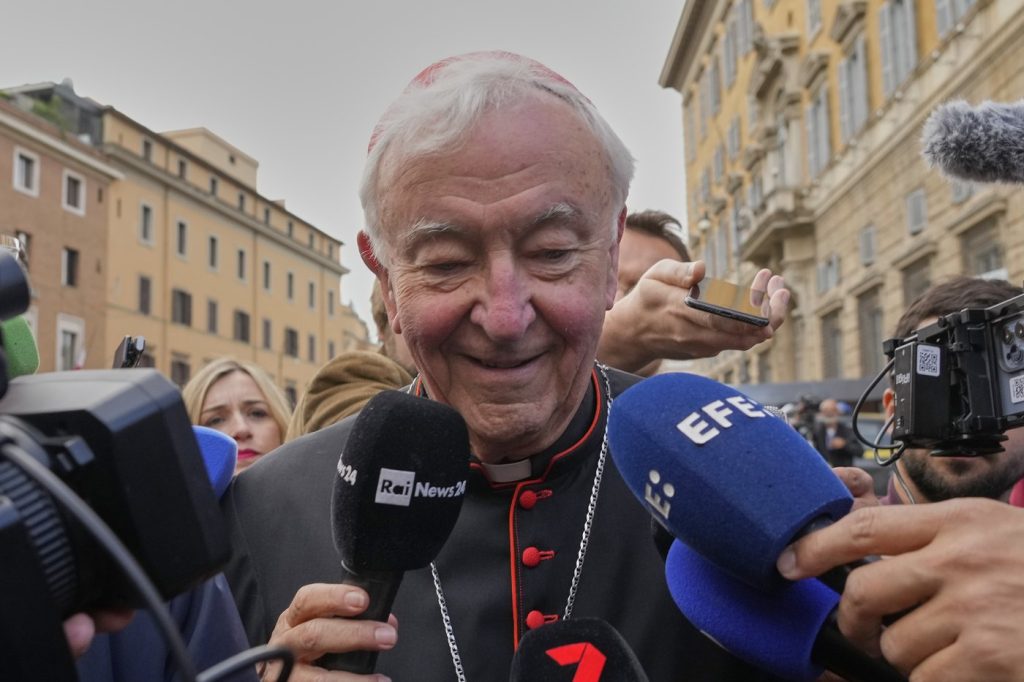VATICAN CITY (AP) - As cardinals gathered for their initial informal meetings following the funeral of Pope Francis, they were immediately surrounded by journalists at the gates of the city-state. The media was eager for any insights regarding the election of a successor, with expectations that a date for the beginning of the conclave might be announced as early as Monday.
In a scene filled with uncertainty and excitement, reporters bombarded the cardinals with questions about the atmosphere inside, the sense of unity among them, and the timeline for the conclave's commencement. An amusing moment arose when a reporter from a satirical Italian television program persistently questioned whether an Italian cardinal with financial convictions could still cast a vote.
Cardinal Ángel Sixto Rossi, the 66-year-old archbishop of Cordoba, expressed optimism, stating there is a “hope of unity.” He emphasized the necessity for the new pope to maintain the pastoral focus on marginalized individuals and the anti-war stance championed by Francis. However, some conservative cardinals appear more inclined to refocus the Church on the core doctrines highlighted by past Popes like St. John Paul II and Pope Benedict XVI, opposing Francis’ social justice initiatives and outreach to LGBTQ+ communities.
British Cardinal Vincent Nichols, aged 79 and the archbishop of Westminster, insisted on the importance of church unity and minimized mentions of divisions within the ranks. “The role of the pope is to essentially hold us together,” he noted, reflecting the sentiment for cohesion among the cardinals during this crucial time.
Venezuelan Cardinal Baltazar Enrique Porras Cardozo expressed belief that the conclave process would be swift, predicting a decision within “two to three days” once the voting commences. However, looming uncertainty remains regarding participation rates, as cardinals age 80 and above are ineligible to vote. A Spanish cardinal has already announced he will not travel to Rome due to health concerns.
A significant point of speculation is whether Cardinal Angelo Becciu will gain access to the Sistine Chapel to vote. Becciu, previously a highly influential cardinal, was forced to resign and renounce his rights in 2020 due to embezzlement and financial fraud allegations. Although he is currently appealing his conviction, the Vatican lists him as a “non-elector,” leading to an ongoing debate about his voting rights in the conclave.
As the voting cardinals assemble, many are characterized by their diverse backgrounds. The College of Cardinals comprises individuals from around the world, many of whom were appointed by Francis during his 12-year papacy. However, some cardinals may not yet be familiar with each other, raising concerns about building consensus. Of the 135 eligible electors, 108 were appointed by Francis himself, and notable discussions have emerged regarding the influence of African cardinals.
While probing into unity among African cardinal electors, Nigerian Cardinal John Olorunfemi Onaiyekan mentioned that they did not converge for a political gathering but rather to elect a new pope. Reflecting on the established opposition against Francis’ outreach to LGBTQ+ communities, speculation exists about how these 18 African electors might shape the evolving landscape of the conclave.
Indian Cardinal Anthony Poola, who is 61 and one of four Indian electors, conveyed that there existed a sense of unity among cardinals. Nonetheless, he acknowledged that “anything could happen,” highlighting the unpredictability of the conclave process. On the other hand, Rossi expressed a sense of apprehension about participating in his first conclave, humorously admitting he felt “afraid.”
The atmosphere in St. Peter’s Square was charged as journalists rushed to capture any glimpse of cardinals arriving. Among them was Italian Cardinal Matteo Zuppi, a potential papal candidate, who navigated the crowd with levity but refrained from revealing any insights. As each cardinal arrives, anticipation builds for not only the selection of a new pontiff but also the underlying dynamics that will shape the future of the Catholic Church.











